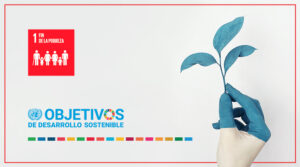It is well known that the majority of countries and entities in the Western world agreed more than five years ago to join forces against some of the most harmful scourges in the world, in what they called the 2030 Sustainable Development Goals. Among them, poverty might be the one that is most urgent, and also most difficult to be eradicated. The aim is to eliminate the need through the joint work and good practice of entities of all kinds, but… how can we help to achieve such an ambitious goal?
The solution to this question could be in ICTs. Over time, technology has not only made life easier for us, but has also made life cheaper. To reduce poverty it is not enough to better distribute the resources available to us but it is also necessary to reduce the cost of basic services for people throughout the world and to ensure that people have access to the same opportunities, regardless of where they were born. ICTs (which already connect people from all over the world) are gradually reducing the differences in opportunities, although there is still a long work ahead. In Gradiant we think that the solution lies in getting everyone to access the technology in an equitable and safe way.
Gradiant, technology and sustainable innovation
Gradiant does not act just as a foundation to help companies get into digital transformation. Our social work goes far beyond purely commercial work and we believe that the daily work of our team can be used to address some of the world’s most important problems and gaps, including poverty.
From our headquarters in Vigo, we already develop communications and positioning systems with a view to being used in all kinds of industries, from the aeronautical sector to mobile communications. Getting all the inhabitants of the planet to have access to these tools will allow us to eliminate the geographical factor as a barrier to the development of any citizen.
Within one of the projects we participate in, the project of the national Cervera network Open-VERSO, is working on technologies that allow the deployment of a 5G network based on general purpose hardware and free software, thus facilitating the creation of advanced, low-cost communications systems that can serve remote or hard-to-reach locations that traditionally suffer from a lack of choice.
Not long ago, when you went on vacation to the village you had to climb on a roof, go to the main square or the cyber to chat a few minutes with your friends or your girlfriend. Today, even the most remote parts of the country are beginning to enjoy the advantages of optic fibre. The aim is to ensure that these benefits also reach the rural population.
Security
But, implementing the technology will only be positive if it is made safe, both for those who know the dangers of the web, and for those who have not yet tanned in that world. In recent years Gradiant has become an important player at the cybersecurity market in Europe. Some of our technology solutions are already being used to ensure the security of purchase processes and users’ authentication. Technologies such as biometrics, where we have more than ten years of experience, are already being used in sectors as sensitive as banking or health. However, there is no point in creating cutting-edge technology if it can only be used by people with specific knowledge of the subject. That is why we put all our efforts to make this tool simple and easy-to-use, allowing everyone to take advantage of its benefits, reducing inequalities between people, regardless of their level of education and social class.
Beyond equalizing people around the world, in terms of opportunities and connectivity, ending poverty requires protecting the most vulnerable. Protect them from the many criminals who rely on new technologies to commit fraud. In this sense, the poorer a region is, the more likely it is that someone can find crime and deception an easy way out of their precarious situation. Protecting their peers from these attacks is essential to ending poverty.
Projects like EGIDA allow us to continue moving forward. In this way we hope that some of the progress we make with our partners will become a security barrier for the most vulnerable.
Our commitment is to end poverty in all its forms. Ending technological poverty with tools to make easier and safer access to the globalized world we live in. And finishing economic poverty, through technologies that make it possible to bring the rural population closer to the facilities of the big cities of the world, eliminating the differences in opportunities and ensuring that we all compete in a fair world,where the place you were born does not determine your future.



